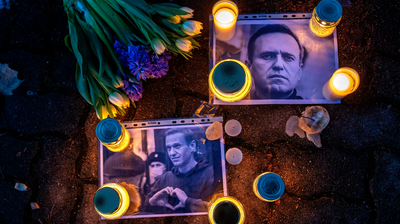
In June 2021, President Biden warned of “devastating” consequences for Russia if opposition leader Alexei Navalny died in prison.
As that possibility became a reality Friday, the White House used Navalny’s death to crystalize the dangers of walking away from Ukraine and NATO allies. And the president told reporters the White House is “looking at a whole number of options right now” about how to respond to Navalny’s death.
Biden and other officials placed the blame for Navalny’s death squarely with Russian President Vladimir Putin. In remarks from the White House, Biden excoriated House GOP leaders for going on a two-week recess without taking action on his request for Ukraine aid.
Biden himself seemed to acknowledge the U.S. has already exhausted some of the ways it can squeeze Russia. The administration has rolled out a plethora of sanctions in response to Russia’s invasion of Ukraine, and thousands of Russians have died in fighting there in part because of the U.S. providing military equipment.
Meanwhile, the administration’s efforts to provide support for Ukraine have been stonewalled by Republicans in the House, and former President Trump has in recent days renewed fears he would undermine the NATO alliance if he wins reelection.
“This tragedy reminds us of the stakes of this moment. We have to provide the funding so Ukraine can keep defending itself against Putin’s vicious onslaughts and war crimes,” Biden said.
“History is watching the House of Representatives. The failure to support Ukraine at this critical moment will never be forgotten; it’s going to go down in the pages of history,” he continued. “This has to happen. We have to help now. We have to realize what we’re dealing with with Putin.”
Biden’s calls for Congress to act reflected the gravity of the moment when it comes to Russia: On top of Navalny's death, U.S. officials warned Thursday that Russian forces were close to taking control of the eastern Ukrainian city of Avdiivka, and the White House confirmed this week that Moscow is working on an “anti-satellite” capability in space.
At the same time, Trump, the likely GOP presidential nominee in November, has in recent appearances suggested he would not protect NATO allies if they were not contributing enough to meet the alliance’s defense spending targets.
“Whatever response the administration puts forward is going to be coordinated with allies and partners,” said Emily Horne, a former National Security Council spokesperson in the Biden White House.
“Here at home, I think you’re going to see the president and his team drawing a very clear line between a competent administration that respects the importance of alliances, and that of Donald Trump, who said not six days ago he would encourage Russia to do 'whatever the hell they want.'”
The White House has also unsuccessfully pushed for the release of Evan Gershkovich and Paul Whelan, two Americans deemed wrongfully detained in Russia on espionage charges.
Navalny, who gained notoriety as an outspoken critic of Putin and the leader of the political opposition in Russia, died Friday at the age of 47 while in prison. The Russian Federal Prison Service said Navalny felt unwell after a walk and lost consciousness.
He was serving a 19-year sentence on charges of extremism, and in December was moved from a different prison to the highest-security level facility in the country, near the Arctic Circle.
Navalny has been imprisoned since January 2021, when he returned to Russia after recovering from a poisoning that he blamed on Putin, who has denied trying to kill Navalny with the nerve agent he received treatment for.
Biden said after a 2021 meeting with Putin in Geneva that there would “devastating” consequences for Russia if Navalny died. Asked Friday about those comments, Biden noted Russia has faced “a hell of a lot of consequences” in the three years since, mostly over its invasion of Ukraine.
But he still signaled there would be some response over Navalny’s death.
One former Biden official said there will likely be a “strong emphasis” on the United States’s relationships with its NATO partners, and any action would come after deliberate consultations with allies.
White House officials believe Navalny’s death further underscores the stark choice facing Americans about the country's role on the world stage.
Speaker Mike Johnson (R-La.) has rebuffed legislation to provide billions of dollars in aid to Ukraine even after it passed with an overwhelming bipartisan majority in the Senate.
Trump last weekend brazenly signaled the U.S. may not come to the aid of NATO members who came under attack from Russia.
“You didn’t pay? You’re delinquent?” Trump said at a South Carolina rally. “‘No, I would not protect you. In fact, I would encourage them to do whatever the hell they want. You gotta pay. You gotta pay your bills.’”
Vice President Harris made the stark divide between Trump’s worldview and that of the Biden administration a central theme of her remarks at the Munich Security Conference on Friday, an event that was largely overshadowed by news of Navalny’s death.
“There are some in the United States who … suggest it is in the best interest of the American people to isolate ourselves from the world. To flout common understandings among nations. To embrace dictators and adopt their oppressive tactics and abandon commitments to our allies in favor of unilateral action,” Harris said.
“Let me be clear: That worldview is dangerous, destabilizing and indeed short-sighted,” Harris continued. “That view would weaken America and would undermine global stability and undermine global prosperity. President Biden and I therefore reject that view.”